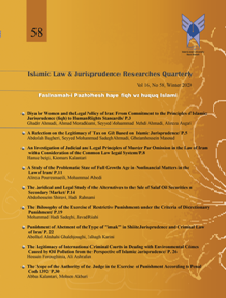The Philosophy of the Exercise of Restrictive Punishments under the Criteria of Discretionary Punishment
Subject Areas : Private lawMohammad Hadi Sadeghi 1 , Javad Riahi 2
1 - Teacher
2 - Teacher
Keywords: Proportion of act and reaction, Criminal's character, Victim's interests, Restrictive punishment,
Abstract :
According to the sources of Islamic jurisprudence, expediency of judge in the selection of discretionary punishment means that the judge should choose the best reaction by considering the criteria related to three elements of crime, victim and criminal. Therefore, the examination of these elements demonstrates the reactions that may be chosen. The present study, using a descriptive–analytical method, has examined criteria related to those elements and has found out that the consideration of the criteria and norms of discretionary punishment, sometimes, necessitate the exercise of the restrictive punishment as the most advisable and the most effective reaction. Therefore, judges should determine restrictive punishment in appropriate cases and legislator and judicial directors should guide and conduct judges to exercise the restrictive punishments in those situations.
الف- فارسی
ب- عربی
ج) انگلیسی
Bottoms, A., Rex, S. & Robinson, G. (2004). Alternatives to prison options for an insecure society (1st ed.). London: Willan Publishing.
Brownlee, I. (1998). Community punishment: A critical introduction (1st ed.). London: Longman.
Scott, D. (2008). Penology (1st ed.). London: Sage Publications.
Tonry, M. (1999). The fragmentation of sentencing and corrections in America. Washington DC: U.S Department of Justice, Office of Justice Programs, National Institute of Justice.
_||_A Group of Scholars (2007). Sources of Shi’a jurisprudence (1st ed.). Tehran: Green Culture Publications.
Aba Salaah, T. (2001). Al-Kafi in jurisprudence (1th ed.). Esfahan: no publication.
Allameh Helli, H. (no date). Tahrir al-Ahkam al-Sharei. no place: no publication.
Ancel, M. (1996). Social defense (3rd ed.) (M. Ashouri, & A. H. Najafi,Trans.). Tehran: University of Tehran Publications.
Aqajamal Khansari, M. (1987). A commentary of Qorar-Al-Hekam & Dorar-Al-Kalem (4th ed.). Tehran: University of Tehran Publications.
Bahaei Ameli, B. M., & Savoji, N. (no date). Jame-Abbasi and its complement (1st ed.). Tehran: Farahani Publishing Institution.
Beihaghi, A. A. (2011). Al-sonan al-kobra. Beirout: Dar al-Ma’refat.
Bottoms, A., Rex, S., & Robinson, G. (2004). Alternatives to prison options for an insecure society (1st ed.). London: Willan Publishing.
Brownlee, I. (1998). Community punishment: A critical introduction (1st ed.). London: Longman.
Farabi, A. M. (1969). Policy of town (S.J. Sajjadi, Trans.). Tehran: Philosophy Association Publishing.
Gharrafi, Sh. (no date). Al-Forough. Beirout: Dar-Alma’refat.
Ghazaei, M. (1972). Persian interpretation of Shahab-Al-Akhbar (1st ed). Tehran: Scientific & Cultural Publishing Center.
Ghazzali, E. M. (1977). Evolution of sciences of religion (2nd ed.). (M. Kharazmi, Trans.). Tehran: Scientific & Cultural Publishing Corporation.
Hajideh Abadi, M. A., & Niknasab, A. A. (2018). Theory of agreement on Hadd (prescribed) punishments, religious jurisprudential principles and executive challenges. Journal of Islamic Law & Jurisprudence Researches. 14(52). 73-92.
Hajitabar H. (2019). Role of religious institutions in preventing crimes (challenges and solutions against it). Journal of Islamic Law & Jurisprudence Researches. 15(56). 47-68.
Harrani, I. H. (2002). Tohat al-oghoul (2nd ed.). Qom: Islamic Publishing House affiliated with the Society of Seminary Teachers in Qom.
Hossaini Shirazi, S. M. (2008). The rights. Beirout: no publication.
Hor al-Ameli, M. (2007). Vasael al-shi’a (1st ed.). Qom: Ahl-Al-Bayt Institution.
Hosseinnezhad, M. (2019). The jurisprudence investigation of Iinsolence behavior in cyberspace. Journal of Islamic Law & Jurisprudence Researches. 15(55). 53-74.
Ibn Hayyon, N. (2006). Daa’eim al-Islam (2nd ed.). Qom: Ahl-Al-Bayt Institution.
Ibn Rouzbehan, F. (unknown). Solouk- Al-Molouk (1st ed.). Tehran: Kharazmi Publishing.
Ibn Saeid, Y. (2007). Nozhat al-Nazer (1st ed.). Najaf: Al-Aadaab Publications.
Ja’fari, M. T. (1997). Jurisprudential articles (1st ed.). Tehran: Keramat Publishing Institution.
Maverdi, A. (2004). Governance procedure (1st ed) (H. Saberi, Trans.). Tehran: Scientific & Cultural Publishing.
Mechel, R. (2008). History of criminal justice (1st ed.) (S. Alasti, Trans.) Tehran: Mizan Publications.
Minoei, E. & Pourghahremani, B. (2019). Interference decrees in the crimes subject of retaliation (Qisas) envisaged under Islamic penal code adopted in 2014. Journal of Islamic Law & Jurisprudence Researches 15(55).179-198.
Mirza Qommi, A. (1901). Jame al-Shatat. Tehran: no publication.
Montazeri, H. A. (2000). Jurisprudential foundations of Islamic government (3rd ed.) (M. Salavati, Trans.). Tehran: Saraei publications.
MoQaddas Ardebili, A. (1591). Zobda al-Bayan Fi Ahkam-al-Quran (1st ed.). Tehran: Al-Maktaba Al-Ja’faria.
Mosavi Ardebili, S. A. (2001). Feqh al-Hodud and al-Ta’zirat (1st ed.). Qom: Maktaba Amir Al-Momenin.
Najafi, M (no date). Javaher al-Kalam (7th ed.). Beirout: Dar-Al-Ehya Al-Torath Al-Arabi.
Quran. (1999). Translated by Elahi Qomshei, M. Tehran: Sabanegar Publishing.
Ramli, Sh. (no date). Nahayat al-Mohtaj. Beirout: Dar al-Ehya al-Torath al-Arabi.
Sabzevari, S. A. (2011). Mohazzab al-Ahkam (4th ed.). Qom: Ayatollah Sabzevari Institute.
Sadeghi, M. H. (1994). Penal branch of criminal policy of Islam. Phd Thesis in Criminal Law and Criminology. University of Teachers’ Education.
Safi Golpaygani, L. (no date). Discretionary punishment. Qom: Islamic Publishing House affiliated with the Society of Seminary Teachers in Qom.
Sarikhani, A., & Nikparvar, M. (2018). Spirit of sharia and its functions: focusing on Imamiyah criminal jurisprudence. Journal of Islamic Law & Jurisprudence Researches. 14(53).109-128.
Scott, D. (2008). Penology (1st ed.). London: Sage publications.
Shahid al-Avval, M. (no date). Al-Qavaed & al-Favaed. Qom: Al-Mofid Publications.
Shahid al-Sani, Z. (2011). Masalek al-Afham (1st ed.). Qom: Islamic Knowledge Institution.
Sharif al-Razi, M. (2012). Nahj al-Balaghat (1st ed.). Qom: Hejrat publishing.
Sothile, K., et al. (2004). Understanding criminology (1st ed.) (M. R. Seddiq, Trans.). Tehran: Dadgostar Publications.
Tabatabaei, M. H. (no date). Al-Mizan interpretation of Quran (3rd ed.). Qom: Allameh Tabatabaei’s Scientific Foundation.
Tamimi Amodi, A. (1977). Qorar al-Hekam & dorar al-kalem’s tasnif (1st ed.). Qom: Islamic Publishing House affiliated with the Society of Seminary Teachers in Qom.
Tonry, M. (1999). The fragmentation of sentencing and corrections in America. Washington DC: National Institute of Justice.
Tousi, Kh. N. (1994). Naseri’s ethics (5th ed). Tehran: Kharazmi Publications.


